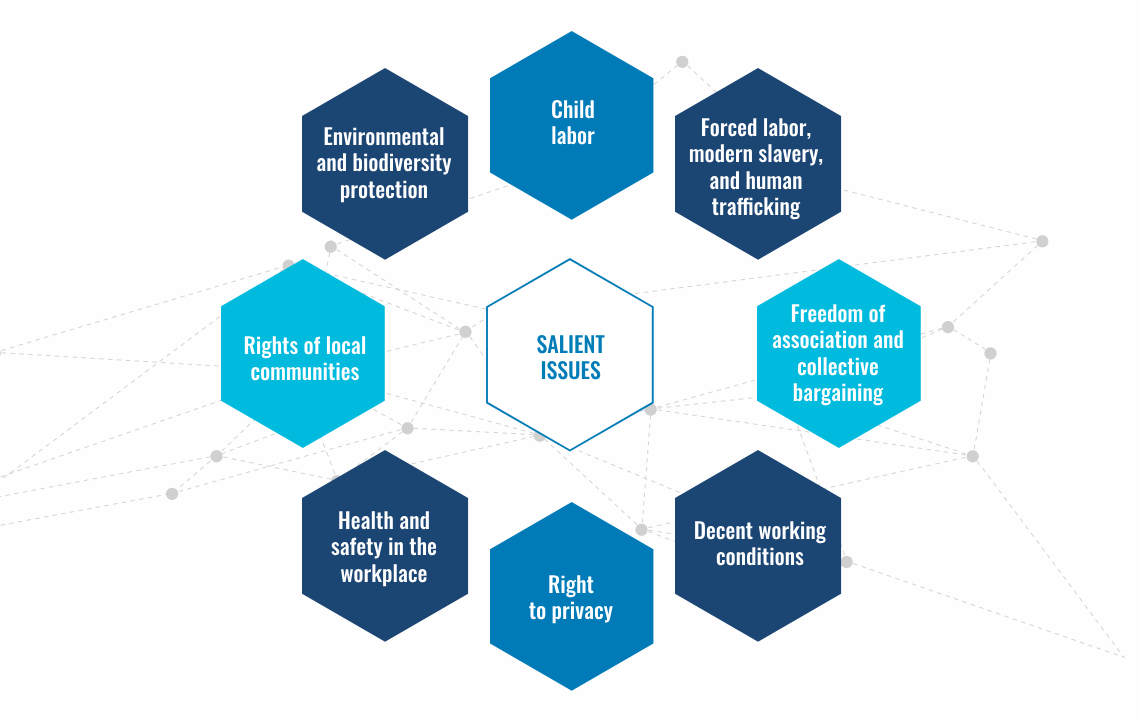

Committments and policies
We consider paramount to ensure and advocate for the respect of human rights within our operations and commercial relationships.
In this regard, since 2019, Fincantieri has voluntarily adhered to the 10 Principles of the United Nations Global Compact. These principles, in the area of human rights, call on businesses to commit to promoting responsible practices in the following areas:
- Human Rights: promoting and respecting universally recognized human rights, ensuring that we are not complicit, even indirectly, in human rights abuses.
- Labor: supporting workers' freedom of association and the right to collective bargaining, contrasting all forms of forced and compulsory labor, eradicating child labor, and preventing any form of workplace discrimination.
- Environment: Adopting a preventive approach to environmental challenges, promoting initiatives that foster greater environmental responsibility, and encouraging the development and dissemination of sustainable technologies.
- Anti-Corruption: Combating all forms of corruption, including extortion and bribery.
These principles guide our commitment to sustainable and responsible development, contributing to a more equitable and prosperous future for all. Accordingly, we have integrated them into our Human Rights Policy – Commitment for the respect of Human Rights and Diversity, which is inspired by the following international frameworks:
- The UN International Bill of Human Rights
- The European Convention on Human Rights
- The Fundamental Conventions of the International Labour Organization (ILO)
- The EU Corporate Sustainability Due Diligence Directive (CS3D)
Our policy demonstrates a continuous commitment to addressing the evolving needs of institutions, society, and the market. To ensure it remains aligned with these expectations, we regularly review and update the policy. In confirmation of this commitment, on September 30, 2024, the Board of Directors of Fincantieri S.p.A. approved an updated version of the document.
In line with the UNGP Reporting Framework, the latest version focuses on Salient Human Rights Issues, or the primary negative impacts that our operations and commercial relationships could have on human rights. The new structure is the outcome of a Human Rights Risk Assessment (HRRA), which identified the areas most exposed to such risks. The updated policy addresses the following salient issues:


Furthermore, our policy has always placed special emphasis on Diversity, Equity, and Inclusion, which are of fundamental importance to our Group, with specific measures adopted to address these areas.
Upholding the respect of Human Rights along the Value Chain
Throughout 2023, we strengthened our commitment to uphold the respect of human rights, anticipating the requirements set forth by the Directive of the European Parliament and of the Council on Corporate Sustainability Due Diligence (CSDDD). As part of this effort, we conducted a Human Rights Risk Assessment (HRRA).
During the preliminary saliency assessment phase — which led to the identification of the Salient Issues incorporated into our Human Rights Policy — we adopted the lens of risk to people, actively engaging our internal stakeholders throughout the process.
The HRRA process consisted of due diligence with a focus on ensuring respect for human rights. It was conducted across our production sites in Italy and Europe, including contractors and Tier 1 suppliers with whom Fincantieri maintains commercial relationships. This activity was carried out through a structured analysis of actual and potential negative impacts, following a risk-based approach.
The analyses conducted as part of the HRRA allowed us to map the key risk elements along the value chain that require monitoring and management. Specific risk levels were assigned to these elements, considering the market segment and geographic area involved. Potential human rights violations, in fact, are closely tied to the political and social conditions of the countries where Fincantieri operates.
Based on these findings, the Group will define monitoring activities and implement targeted actions in specific sites, with a focus on continuous improvement.
Since 2019, as part of the safeguards applied along the supply chain, we have launched an ongoing program of second-party ESG audits, conducted at priority/strategic Group suppliers. These ESG audits are carried out using two checklists, one of which addresses health, safety, and human rights topics. This checklist also assesses compliance with the guidelines outlined in the Supplier Code of Ethics, which has “Labor and Human Rights” as one of its key pillars.
Between 2019 and 2023, despite the challenges posed by the COVID-19 emergency, 162 ESG audits were conducted on strategic suppliers. The results consistently demonstrated full compliance with Fincantieri's standards.
ESG audits are just one of several tools that Fincantieri has implemented to ensure respect for human rights along the value chain. Other measures include the supplier qualification process, which also covers compliance with labor regulations, and the whistleblowing system, which is accessible to both contractors and subcontractors.
Which objectives do we have on this topic?
Human rights: 2023-2027 Sustainability Plan objectives and target
Commitment to creating the socio-economic conditions to ensure respect for human rights throughout the value chain
Discover the objectives
In accordance with the guidelines being defined* and international best practices, proactively identify and assess potential risks and impacts related to the respect of human rights, incorporated in the policy and Code of Ethics, referred to and signed by suppliers in the general terms and conditions of the order
* In order to anticipate the demands contained in the Proposal for a Directive of the European Parliament and of the Council on the Duty of Care of Businesses with regard to sustainability
| Description/Target | Timeline | Perimeter | Status | SDGs |
|
Due diligence on Italian and European production sites and their satellite businesses |
2023 |
Group |
In order to identify any human rights impacts during the year, the due diligence process was initiated on Italian and European sites, including contractors and suppliers (Tier 1) with whom Fincantieri does business. |
|
|
Implementation of a plan of targeted interventions following due diligence |
2024 |
|||
|
Monitoring compliance through the formalization of the monitoring and maintenance plan |
2025 |
Annual (second party) sustainability audits by Fincantieri at suppliers’ premises to assessand monitor suppliers' compliance with human rights, health and safety and the environment
| Description/Target | Timeline | Perimeter | Status | SDGs |
|
Audits of the Group's suppliers of priority/strategic interest on respect for human rights, health and safety and the environment (approx. 200 suppliers including the remaining 7 not carried out due to COVID pandemic issues) with at least 40 audits per year. |
2023-2027 |
Group (excluding American subsidiaries) |
In 2023, 49 second-party sustainability audits were conducted through internal Fincantieri resources. Based on the results of the audits, actions to be implemented regarding that specific supplier are defined. In 2023, no audits fell short of expectations. |
|



